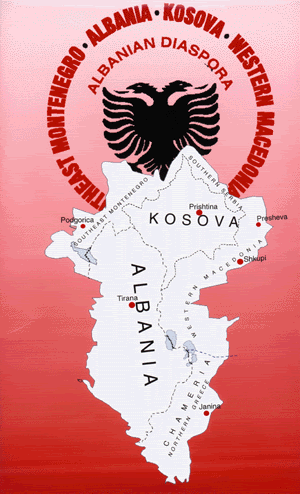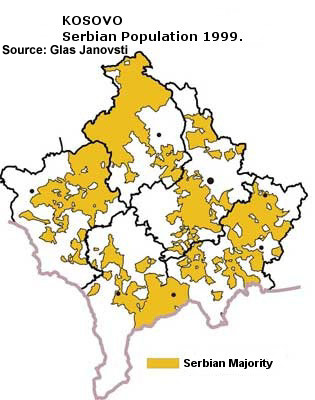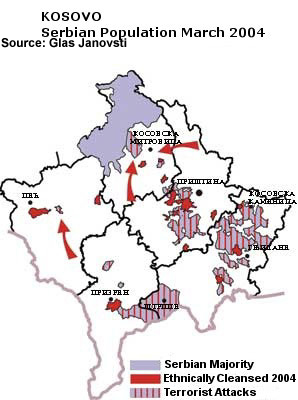Kosovo: Two years of Quasi-state
“US recognition of severed Kosovo province was a serious mistake, leading to an escalation of tensions, instead of calming down the situation in the Balkans ... consensus boils down to the fact that nobody knows where Kosovo is” (John Bolton)
"The recognition of Kosovo was premature and conditioned by great pressure from the former American administration"... "Today, we can see that two-thirds of the international community does not recognize Kosovo ... this shows that we are talking about a grave mistake" (Gerhard Schröder)
 Two years has gone since Kosovo Albanians declared their independence from Serbia. However calling to Kosovo needs country code 381 – which is Serbia – or by GSM 377 44 (via Monaco Telecom) or others via Serbian operators. This because as at this time, Abkhazia, Kosovo, Transnistria, Somaliland, South Ossetia and others are not in the ISO 3166-1 standard due the absence of recognition by the United Nations. Situation is one minor example about Kosovo “statehood”. Besides formalities – like that the province is administrated as international protectorate by foreign powers – the on the ground status is more complicated and even going more far away from drawing board ideals of Washington and Brussels.
Two years has gone since Kosovo Albanians declared their independence from Serbia. However calling to Kosovo needs country code 381 – which is Serbia – or by GSM 377 44 (via Monaco Telecom) or others via Serbian operators. This because as at this time, Abkhazia, Kosovo, Transnistria, Somaliland, South Ossetia and others are not in the ISO 3166-1 standard due the absence of recognition by the United Nations. Situation is one minor example about Kosovo “statehood”. Besides formalities – like that the province is administrated as international protectorate by foreign powers – the on the ground status is more complicated and even going more far away from drawing board ideals of Washington and Brussels.
 Those who supported Kosovo independence said that Kosovo was unique case and not precedent thousands of ethnic or separatist movements around the world made other conclusion – Abkhasia and South Ossetia came first from the “Pandora box” which Kosovo opened. To limit the degree of damage it is time to restore international forums and law.
Those who supported Kosovo independence said that Kosovo was unique case and not precedent thousands of ethnic or separatist movements around the world made other conclusion – Abkhasia and South Ossetia came first from the “Pandora box” which Kosovo opened. To limit the degree of damage it is time to restore international forums and law.
Legal aspect
From legal aspect the Nato bombings and later orchestrated unilateral declaration of independence (UDI) of Kosovo Albanians were against international law and violation of the UN Charter, Helsinki Accords and a series of UN resolutions including the governing UNSC resolution #1244. Officially Kosovo is international protectorate administrated by UN Kosovo mission. Now the case (UDI) is in International Court of Justice and its statement is expected Mid 2010. (More “UN is sending Kosovo case to ICJ”).
Whatever - depending point of view - status Kosovo has, the province is de facto administrated by international community. However the administration is still in full chaos because there is administrators more than enough. 1st (not order of authority) we have European Union Special representative (EUSR) who is double hatted as chef of International Community Office; 2nd we have Head of EU Commission liaison office; 3rd we have EULEX mission; 4th there is KFOR troops including Europe's second largest Nato base, 5th international administrator is from UN side - SRSG as Head of UNMIK mission. All these administrators and other supervisors like OSCE, Quint etc - are playing in the same sandbox wondering who is doing what and where. In addition in Kosovo is also local stakeholders like separatist governments institutions in areas habitat by Albanians and parallel Serb institutions in areas habitat by Serbs. (More e.g. in (“EULEX, UN and mess-up in Kosovo” )
The fact on the ground is that northern part of Kosovo is integrated to Serbia like it always has been, as well those pats south of Ibar river, which are not ethnically cleansed by Kosovo Albanians. Between ethnic groups a huge operation of international community is going on with its foggy ideas.
Refugees and unrealized returns
The refugee and IDP (“internally displaced persons”) question is of paramount importance in Balkans. In Serbia the refugee problem came when Serbs were expelled from East Croatia and Croatian Krajina. The IDP problem is a follow-up of Kosovo conflict when some 200.000 Serbs and some thousands of Roma were expelled from there to northern Serb-dominated part of province or to Serbia. During Nato bombings also Kosovo Albanians – about 700.000 – escaped from the province but most of them have returned back. Most of Montenegro refugees – 16259 – fled from Kosovo. Nearly all of Serbia’s IDPs fled also from Albanian majority parts of Kosovo province. Despite EU's nice ideas about multi-ethnic Kosovo and implementation of housing and other return programs only a fraction (few per cent) of Serb IDPs have returned to Kosovo after ten years of international administration while majority of Kosovo Albanian refugees returned during last half of year 1999.


To table below I have collected the numbers of refugees and IDPs in western Balkans; the sum total includes also asylum-seekers, stateless etc. persons. As source I have used UNHCR report 16thJune 2009 and “Internal Displacement in Europe and Central Asia” report made by UNCHR and The Internal Displacement Monitoring Centre (IDMC), established in 1998 by the Norwegian Refugee Council.
| Country | Refugees | IDPs | Total |
| Albania | 65 | 0 | 87 |
| Bosnia-Herzegovina | 7257 | 124529 | 194448 |
| Croatia | 1597 | 2497 | 33943 |
| (FRY) Macedonia | 1672 | 0 | 2823 |
| Montenegro | 24741 | 0 | 26242 |
| Serbia | 96739 | 225879 | 341083 |
The table above is maybe surprising to those who have the picture – made by western mainstream media – in their minds, that (only) Serbs were making ethnic cleansing. In reality today the Serbs are the biggest victims of Balkan wars. (More in my article “Forgotten Refugees – West Balkans”).
Failed post-conflict reconstruction
The new report made by Minority Rights Group International (MRG) gives a bare picture about worsening situation of minority rights in today’s Kosovo. Instead to return to their homes after ethnic cleansing implemented by Kosovo Albanians after Nato intervention 1999 minorities are beginning to leave Kosovo, because they face exclusion and discrimination.
One of the cruellest example of failed post-conflict reconstruction is the case of Roma children living in UN camps in North Mitrovica, Kosovo. So far 81 has already dead after ten years suffering in United Nations Camps for Internally Displaced Persons (IDPs), living in place which is described the most toxic site in Eastern Europe. Their case gives another perspective related to “humanitarian intervention” implemented by Nato and to international administration implemented afterwards and backed with billions of Euros EU financing. (More in my article “UN death camps, EU money, local negligence”)
Despite huge EU programmes and reports singing their praises the progress in Kosovo has been modest if not non-existing. Kosovo faces major challenges, including ensuring the rule of law, the fight against corruption and organised crime, the strengthening of administrative capacity, and the protection of the Serb and other minorities. EU Commision's 2009 progress reports of Kosovo province and its neighbours can be found as pdf from my Document library.
The focus of international state-building efforts in Kosovo has been
Kosovo highlights the fact that states and international organisations intervening in post-conflict situations should be realistic about what socio-political change they can actually achieve. Despite huge resources and strong mandate international administration can fail if the situation analysis is combination of false supposition and actions based to high flown drawer desk plans. The state-building process can also cease due pressure. This was evident in Kosovo when the eruption of violence in March 2004 pushed the international community towards addressing the status question and throw earlier “standards before status” principle to litter box. (More e.g. in “Pogrom with Prize”)
Insignificant economic base and remarkable social challenge
Official statistics from year 2008 shows that export from Kosovo amounted about 200 millon Euro while import increased to 2 billion Euro, which makes trade balance almost 1,800 million Euro minus. If export is covering some 10 percent of import so from where is money coming to this consumption. The estimate is that when export brings mentioned 71 million Euro the organised crime (mainly drug trafficing) brings 1 billion Euro, diaspora gives 500 million Euro and international community 200 million Euro.
In 2007, more than 40 percent of contributes to direct tax revenues and sustains the delivery of public services Kosovo’s GDP was made up of foreign assistance, remittances and foreign direct investment – mostly privatisation proceeds and the issuing of a second mobile phone licence. All of these outside contributions are likely to decline substantially as a consequence of the global financial crisis, with dire consequences for Kosovo’s budget.
Kosovo has Europe’s youngest and fastest – growing population. Yearly 30,000 more young people enters working age than the number that leave labour markets which due Kosovo's poor economy can not absorb them. Same time the education system is poorly governed, poorly resourced, and prone to corruption. Hardly any of the 30 private universities in Kosovo, for example, have met accreditation criteria (BritishAccreditationCouncil2008), and with few exceptions they provide sub-standard education. This leaves a whole generation of Kosovars without marketable skills and with very limited economic perspectives – at least legal ones.
The poor state of Kosovo’s economy combined to demographic challenge is likely to fuel a range of security threats, such as illegal trafficking, migration, and organised crime.
Organised crime
Links between drug trafficking and the supply of arms to the KLA (Kosovo Liberation Army) were established mid-90s. In West KLA was described as terrorist organization but when US selected them as their ally it transformed organization officially to “freedom” fighters. After bombing Serbia 1999 KLA leaders again changed their crime clans officially to political parties. This public image however can not hide the origins of money and power, old channels and connections are still in place in conservative tribe society.
 In some other important drug transit zones trafficking is reflected in high levels of violence but not in Balkans. UN report explains this that good links between crime organizations and commercial/political elites have ensured that Balkan organized crime groups have traditionally encountered little resistance from the state or rival groups. To keep fragile situation calm (western) international community don't interfere criminal activities leaded its former allies.
In some other important drug transit zones trafficking is reflected in high levels of violence but not in Balkans. UN report explains this that good links between crime organizations and commercial/political elites have ensured that Balkan organized crime groups have traditionally encountered little resistance from the state or rival groups. To keep fragile situation calm (western) international community don't interfere criminal activities leaded its former allies.
The real power in Kosovo lays with 15 to 20 family clans who control “almost all substantial key social positions” and are closely linked to prominent political decision makers. German intelligence services (BND) have concluded that Prime Minister Thaçi is a key figure in a Kosovar-Albanian mafia network. Two German intelligence reports - BND report 2005 and BND-IEP report Kosovo 2007 - are giving clear picture about connection between politics and organized crime; both reports can be found from my document library under headline Kosovo.
I have earlier described circumstances in Kosovo with “Quadruple Helix Model” where government, underworld, Wahhabbi schools and international terrorism have win-win symbiosis. (More in “Quadruple Helix – Capturing Kosovo”) In general there is expectations that Kosovo is sliding to be a “failed state” I am however tending to the opinion that a “captured state” is better definition.
War crimes
The present day circumstances are shadowed also by the fact that most of the war crimes committed 1999 are still unsolved. On the other hand the situation declares null and void the efforts for multi-ethnic society, on the other hand it prevents transformation of Kosovo-Albanian political field from tribe level more democratic practice. For today's politicians war crimes are important to keep non-existing due the imago reasons or because they now are part of regular (illegal) business. Occasionally some details pop up like it was case with organ trafficking (More in “New Cannibalism in Europe too?”)
The actions of the Nato campaign 1999 are quite well documented but despite bombings were against international and war crimes committed no trials has been made. Nato planes destroyed 4 % of its military targets during bombing – partly because for avoiding own casualties they launched missiles so high that could not make difference between wooden decoys and real weapons. Instead of military targets the main damage was made against civilian targets such as destroying an embassy (China), a prison (Istok), three column of Albanian refugees (81 dead March 13th and 75 April 14th), radio-tv station (Belgrade, 16 civilians dead), a passenger train (Grdelica bridge, 14 dead), also a number of infrastructure, commercial buildings, schools, health institutions, cultural monuments were damaged or destroyed. Some 2.500 people (mostly civilians) were dead, material civil infrastructure damage is estimated to be some 30 billion dollars. (More e.g. in “10th anniversary of Nato's attack on Serbia”)
April 14th), radio-tv station (Belgrade, 16 civilians dead), a passenger train (Grdelica bridge, 14 dead), also a number of infrastructure, commercial buildings, schools, health institutions, cultural monuments were damaged or destroyed. Some 2.500 people (mostly civilians) were dead, material civil infrastructure damage is estimated to be some 30 billion dollars. (More e.g. in “10th anniversary of Nato's attack on Serbia”)
Kosovo is still suffering of some consequences of Nato’s 1999 bombings such as the effects of the use of depleted uranium (DU) on the civilian population. The Nato allegedly used shells with depleted uranium which are still today causing an increase in the number of cancer patients. (More from article “Use of Depleted Uranium proved in Nato bombings”)
Epilogue
The outcome today in Kosovo is a quasi-state with good change to become next “failed” or “captured” state if international community does not firm its grip in province. Today’s Kosovo is already safe-heaven for war criminals, drug traffickers, international money laundry and radical Wahhabists – unfortunately all are also allies of western powers.
From my viewpoint the only way to get sustainable solution to Kosovo is through real negotiations between local stakeholders. To get start of real talks US should freeze or withdraw its recognition of Kosovo UDI; otherwise it takes too long time for Kosovo Albanians to find out that some negotiated outcome ? be it cantonization, partition or whatever agreed - could be better than status quo. (About possible solutions “Dividing Kosovo - a pragmatic solution to frozen conflict” and "Cantonisation - a middle course for separatist movements")
The readiness to open new talks over status question may be increasing. I quote Gallup
The latest Gallup Balkan Monitor survey conducted in September 2009 showed Kosovo Albanians are less positive toward independence. Seventy-five percent of Kosovo Albanians said independence was a good thing, down from 93% who said so in 2008. One in five Kosovo Albanians said they did not have an opinion. Furthermore, in 2009, 80% of Kosovo Serbs believed that independence was a bad thing, statistically unchanged since 2008.
When time runs so I think that more and more local population would like to un-freeze conflict and concentrate to issues that matters.
Of course if US wants keep one frozen conflict more in world and if EU is ready to squander more billions of euros for its capacity building efforts nothing needs to be done. (More e.g. in “Kosovo-update”)

Comments